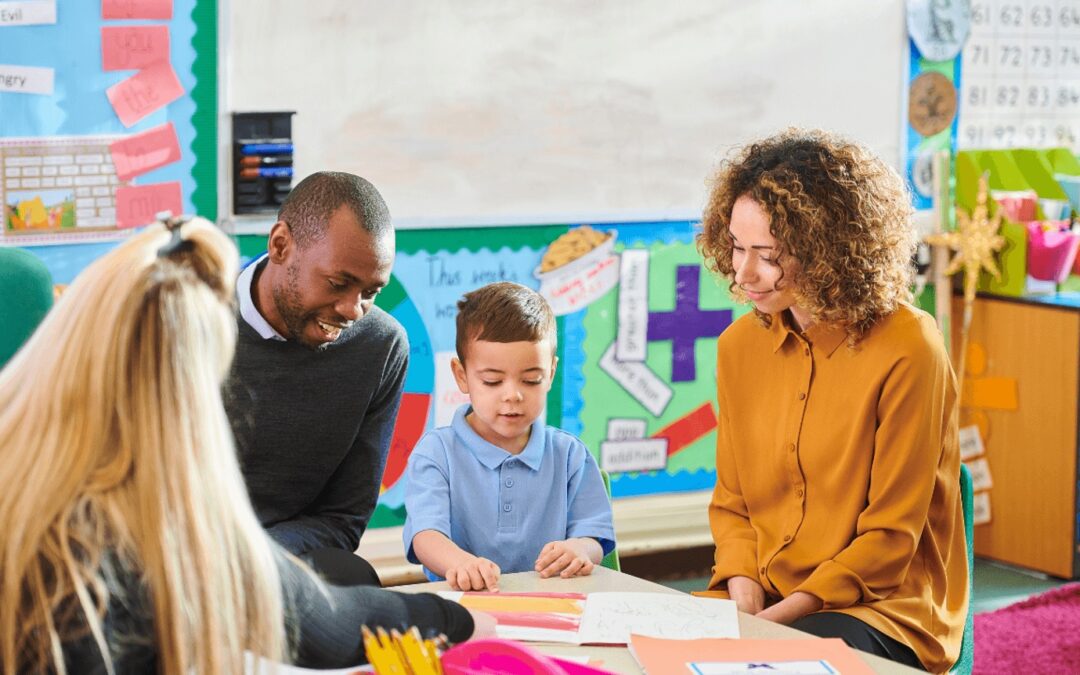How to make the most of the time you get with your child’s teacher.
Educating students is a team effort, and collaboration between family and teacher is vital to your child’s success in school. Parent-teacher conferences offer an uninterrupted opportunity for your family and your child’s teacher to come together to cover any concerns, celebrate milestones, and create an effective plan to help the student succeed as they move through school.
Parent-teacher conferences may be the first time you and your child’s teacher can discuss your child’s development, and should be used to establish a healthy relationship between teacher and parent. This ensures your child has the most rewarding school experience possible. When parents and teachers communicate effectively, it allows children to reach their maximum potential inside and outside the classroom.
Typically, these meetings last 15-20 minutes and, although seemingly brief, can map out the remainder of the school year. Teachers often introduce parents to their teaching style and classroom policies during the session. Parents will also have the opportunity to ask any questions that may arise.
It is beneficial in these meetings to make the teacher aware of your child’s after-school activities, favorite interests, and family relationships, so they gain a complete understanding of your child’s personality, strengths, and areas of possible improvement.

While asking good questions and providing feedback is vital to the parent-teacher conference, listening is just as critical. It is okay that the teacher is an expert on your child’s school life—that is their job!
Parents need not feel frustrated or neglectful if their child’s teacher identifies a behavior or concern that the parents may have not observed previously. Learning from each other’s observations will drive actions that benefit all parties involved but, most importantly, help your child.
As you prepare for these meetings, create a detailed list of questions and stay up-to-date on your child’s days so you are ready to discuss with their teacher. Below are a few ideas of questions that will better serve you and your child in these meetings.
“Is my child able to keep composure in the classroom?”
Social and emotional development is the number one developmental milestone that many teachers agree is the most important. Feeling safe and valued is vital to a child’s development. Learning suffers when students fear for their safety, worry about being bullied, or don’t sense their teachers have high expectations for their success. In a healthy, supportive climate, students are engaged and take intellectual risks.
A great way to grasp if your child is meeting this milestone is to ask whether your child can keep composure in the classroom. Composure is needed to master every other skill in the social-emotional domain – assertiveness, encouragement, empathy, etc. Understanding that no one can make you feel a certain way without your permission is a valuable tool that will last a lifetime, and this skill comes with composure.
While the student needs to develop this skill independently, ensuring the teacher has created an environment that allows them to feel safe enough to develop these skills is equally important. When asking this question, ask about your student, but also question the teacher.
“What Developmental Milestones are you working on with my child right now?”
Developmental milestones are achieved by children by a certain age, yet every child is different. You can discover these skills by searching the CDC website, talking with your pediatrician, and discussing with your child’s teacher. All three sources are experts in child development and will help you understand your child’s growth progression and how to encourage your child to continue growing at home.
While at a parent-teacher conference, ask the teacher which milestones are focused on, how the child is taught, and any progress or achievements the child has garnered. This question will help parents focus on skills they can work on at home and support the learning at school to ensure continued success.
“What can I be doing at home and in between extracurriculars to ensure that my child is set up for success?”
Students whose parents are involved in school are more likely to have better attendance and behavior, get better grades, demonstrate better social skills, enjoy learning, and adapt to school.
We know you are involved and want the best for your child because you’ve made it this far and are preparing for your upcoming parent-teacher conference – good job! In the meeting, ask what level of attention and which activities are covered during the school day. This will help you understand the distribution of how much time and attention is being devoted to both academic and socioemotional development for children at home.
Also, knowing your child’s daily routine and schedule is essential for continuity between home and school. Having meaningful conversations in the car on the way to school and asking informed questions about the upcoming day will help children feel safe and secure, which is the first step to educational success.
Author
Kristen Miller, Director of Education for Celebree School, a leader in early childhood education that provides infant and toddler care, preschool, before and aftercare, and summer camp programs.
Read the Article on Today’s Parent!
https://www.todaysparent.com/kids/school-age/questions-to-ask-at-parent-teacher-conferences/

